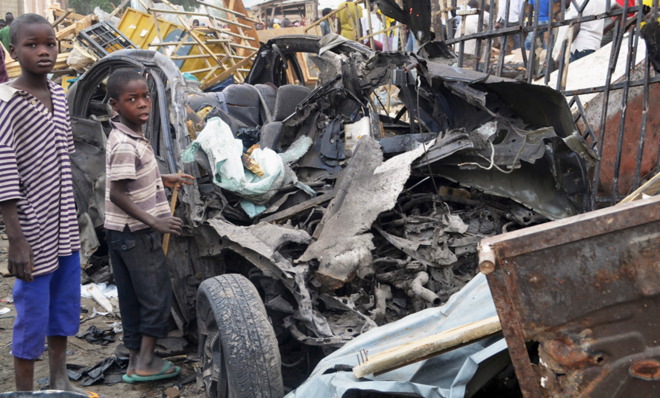Everything you need to know about Boko Haram
Nigeria has the biggest economy in Africa. Why has the country given rise to the Islamist militant group Boko Haram?

What is Boko Haram?
It's one of the most brutal terrorist organizations in the world. Dedicated to forming an independent Islamic state in the north of Nigeria — its name translates as "Western education is forbidden" — the group claimed global prominence in April, when it kidnapped more than 300 schoolgirls and threatened to sell them as sex slaves. That mass kidnapping was just one in a string of atrocities by the group, which have left thousands of innocent civilians dead. In February, its heavily armed militants killed 59 schoolboys by setting alight a boarding school, then shooting or slitting the throats of those who tried to escape. Only last week, gunmen disguised as soldiers slaughtered more than 200 people in three villages. These massacres are occurring with growing frequency, as Boko Haram asserts its control. "Swaths of the north are no-go areas," said one executive at a leading oil firm. "If people think it's not going to spread, they're crazy."
Why is Boko Haram able to run wild?
The Week
Escape your echo chamber. Get the facts behind the news, plus analysis from multiple perspectives.

Sign up for The Week's Free Newsletters
From our morning news briefing to a weekly Good News Newsletter, get the best of The Week delivered directly to your inbox.
From our morning news briefing to a weekly Good News Newsletter, get the best of The Week delivered directly to your inbox.
Much of the population shares the group's fury against Nigeria's dysfunctional government. Boko Haram was formed in 2002 by Mohammed Yusuf, a radical cleric who blamed Western morals for the country's rampant corruption. For seven years, the group campaigned peacefully, building up a wide support base that included civil servants and students. It was only in 2009, when Yusuf was arrested and then killed in police custody, that the group turned to violence. Even today, it is poverty and corruption, not religion, that drive the majority of the group's recruitment. Most of the hundreds of foot soldiers aren't Islamist fanatics — they're poor youngsters sick of their government stealing the nation's wealth. On Transparency International's corruption index, Nigeria is 144th out of 177 countries.
Why is the country so corrupt?
There's a lot of wealth to steal, little law enforcement, and huge economic inequality. Thanks to its vast oil production, the country now has the largest economy in Africa, having overtaken South Africa earlier this year. But on a per capita basis, it is one of the poorest, with 62 percent of its 170 million citizens living on less than $1 a day. At every level of Nigerian society, public officials are on the make, from politicians siphoning off oil wealth to civil servants enriching themselves with sham contracts to policemen demanding endless bribes.
How big is its oil industry?
A free daily email with the biggest news stories of the day – and the best features from TheWeek.com
First discovered in the marshes of the Niger Delta in 1956, crude oil is the lifeblood of Nigeria's economy, accounting for 95 percent of the country's export earnings and 80 percent of total revenue. With production at about 2 million barrels a day, Nigeria is the seventh-largest exporter in the world. But ordinary Nigerians see very little of the profits. Earlier this year, Central Bank Gov. Lamido Sanusi exposed a $20 billion hole in the state oil company's accounts, and revealed that Nigeria's Excess Crude Account — essentially the country's "rainy day" reserves — had fallen from $11.5 billion to under $2.5 billion in 12 months. Sanusi was suspended from the job soon afterward, further fueling suspicions that much of the money had been funneled to President Goodluck Jonathan and his cronies. As one Western official in Nigeria put it, "The oil minister is Jonathan's ATM."
Are Nigerians angry about this?
Furious. Virtually no oil wealth reaches the north, Boko Haram's heartland, where 70 percent live below the poverty line. In the Niger Delta in the south, the biggest problem is the government's failure to clamp down on the illegal oil industry. Incredibly, criminal gangs steal between 100,000 and 400,000 barrels a day, refining it in dangerous makeshift refineries, and selling it as far afield as South America. Sometimes they hijack tankers — insurers now charge as much for passage past Nigeria as Somalia — but more often they cut into pipelines and siphon off the oil, a practice known as "bunkering."
Doesn't that cause spillages?
Indeed it does. Oil spills are a weekly occurrence in the Niger Delta, and the environmental impact is enormous. A 2011 U.N. report warned that the Ogoniland region, one of the worst affected, could take 30 years to recover. Locals' complaints generally fall on deaf ears — or worse. Prominent environmental activist Ken Saro-Wiwa was tried and executed on trumped-up murder charges in 1995. Shell, the primary oil company in Nigeria, was accused of being involved, and paid out $15.5 million in a settlement shortly before the case came to court. For many Nigerians, the Saro-Wiwa affair — a mix of oil, environmental damage, corruption, and government repression — epitomizes the country's plight, and explains why Boko Haram can recruit young Nigerians. "Yusuf would have found it difficult to gain a lot of these people if he was operating in a functional state," Nigerian journalist Ahmad Salkida has written. "But... the frustrations, the corruption, [and] the injustice made it fertile for his ideology to grow fast, very fast, like wildfire."
Building a fortune on bribes
The 2012 conviction of James Ibori, a former governor of one of Nigeria's wealthiest states, gave a rare glimpse into the scale of corruption in Nigeria's political elite. Ibori pleaded guilty to money laundering at a trial in London, after British police and Nigeria's Economic and Financial Crimes Commission showed that he'd used public money to pay for three houses in London, luxury cars, boarding-school fees, and a private jet. Ibori, who had diplomatic immunity during his eight years as governor of Delta state, is thought to have amassed a fortune of $250 million in bribes — $60 for every person in his state, or enough money to provide education or clean water for more than 400,000 Nigerians. He went from working in a hardware shop in London — where in 1991 he was convicted of stealing goods — to within a whisker of the Nigerian vice presidency in 2007. He is now serving a 13-year jail sentence in the U.K.
-
 How the ‘British FBI’ will work
How the ‘British FBI’ will workThe Explainer New National Police Service to focus on fighting terrorism, fraud and organised crime, freeing up local forces to tackle everyday offences
-
 The best family hotels in Europe
The best family hotels in EuropeThe Week Recommends Top kid-friendly hotels with clubs, crèches and fun activities for children of all ages – and some downtime for the grown-ups
-
 Moon dust has earthly elements thanks to a magnetic bridge
Moon dust has earthly elements thanks to a magnetic bridgeUnder the radar The substances could help supply a lunar base